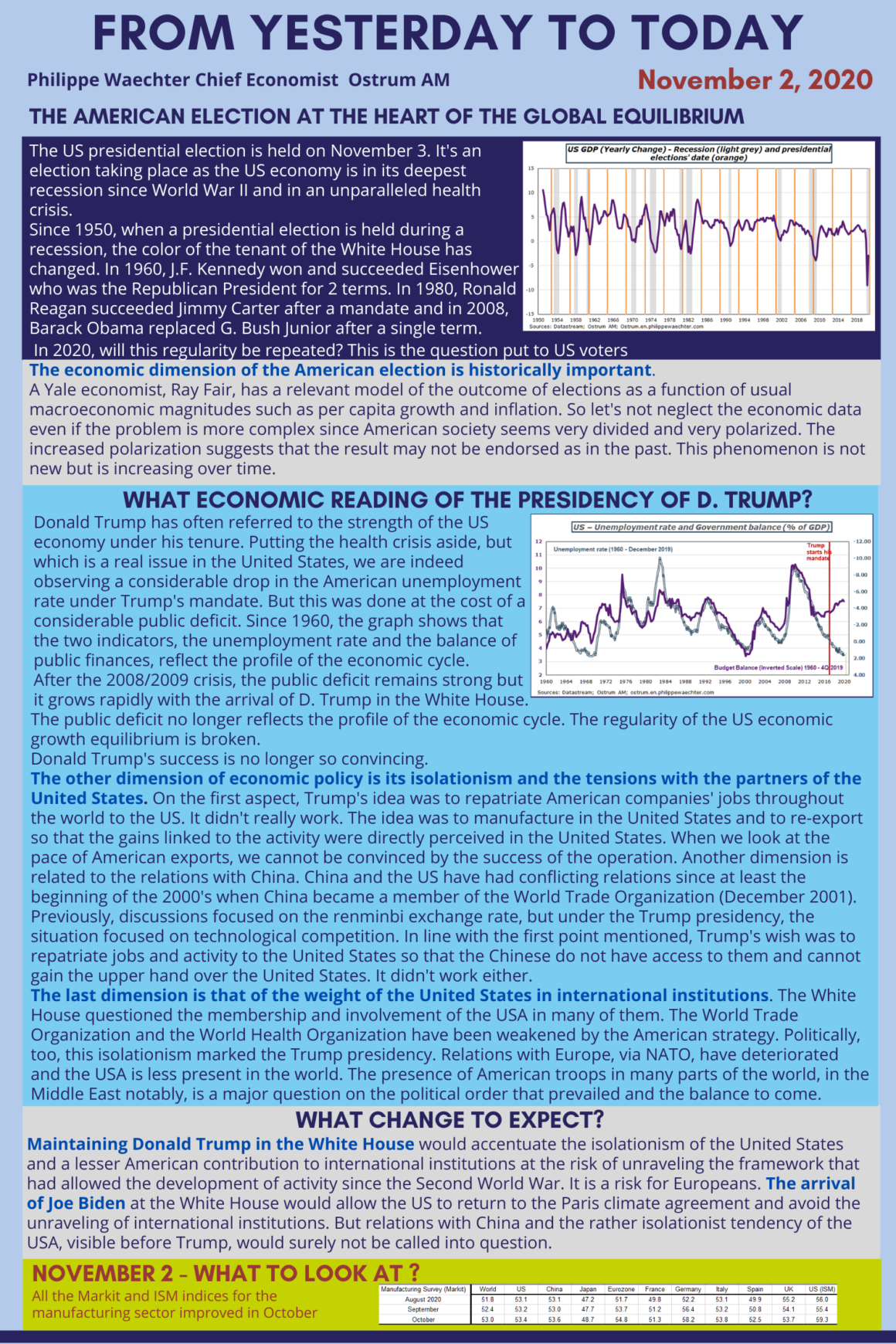The American elections are in the midst of a recession. In the past, this economic dimension of the election has always changed the color of the tenant of the White House.
D. Trump’s economic record is mixed. The economic improvement was made by the widening of the public deficit while the isolationist tendency of the USA was further reinforced. The question is that of the possible change on this last point in case of victory of Joe Biden?

The US presidential election is held on November 3. It’s an election taking place as the US economy is in its deepest recession since World War II and in an unparalleled health crisis.
Since 1950, when a presidential election is held during a recession, the color of the tenant of the White House has changed. In 1960, J.F. Kennedy won and succeeded Eisenhower who was the Republican President for 2 terms. In 1980, Ronald Reagan succeeded Jimmy Carter after a mandate and in 2008, Barack Obama replaced G. Bush Junior after a single term.
In 2020, will this regularity be repeated? This is the question put to US voters
The economic dimension of the American election is historically important.
A Yale economist, Ray Fair, has a relevant model of the outcome of elections as a function of usual macroeconomic magnitudes such as per capita growth and inflation. So let’s not neglect the economic data even if the problem is more complex since American society seems very divided and very polarized. The increased polarization suggests that the result may not be endorsed as in the past. This phenomenon is not new but is increasing over time.
What economic reading of the presidency of D. Trump?
Donald Trump has often referred to the strength of the US economy under his tenure. Putting the health crisis aside, but which is a real issue in the United States, we are indeed observing a considerable drop in the American unemployment rate under Trump’s mandate. But this was done at the cost of a considerable public deficit. Since 1960, the graph shows that the two indicators, the unemployment rate and the balance of public finances, reflect the profile of the economic cycle.
After the 2008/2009 crisis, the public deficit remains strong but it grows rapidly with the arrival of D. Trump in the White House.
The public deficit no longer reflects the profile of the economic cycle. The regularity of the US economic growth equilibrium is broken.
Donald Trump’s success is no longer so convincing.
The other dimension of economic policy is its isolationism and the tensions with the partners of the United States. On the first aspect, Trump’s idea was to repatriate American companies’ jobs throughout the world to the US. It didn’t really work. The idea was to manufacture in the United States and to re-export so that the gains linked to the activity were directly perceived in the United States. When we look at the pace of American exports, we cannot be convinced by the success of the operation. Another dimension is related to the relations with China. China and the US have had conflicting relations since at least the beginning of the 2000’s when China became a member of the World Trade Organization (December 2001). Previously, discussions focused on the renminbi exchange rate, but under the Trump presidency, the situation focused on technological competition. In line with the first point mentioned, Trump’s wish was to repatriate jobs and activity to the United States so that the Chinese do not have access to them and cannot gain the upper hand over the United States. It didn’t work either.
The last dimension is that of the weight of the United States in international institutions. The White House questioned the membership and involvement of the USA in many of them. The World Trade Organization and the World Health Organization have been weakened by the American strategy. Politically, too, this isolationism marked the Trump presidency. Relations with Europe, via NATO, have deteriorated and the USA is less present in the world. The presence of American troops in many parts of the world, in the Middle East notably, is a major question on the political order that prevailed and the balance to come.
What change to expect?
Maintaining Donald Trump in the White House would accentuate the isolationism of the United States and a lesser American contribution to international institutions at the risk of unraveling the framework that had allowed the development of activity since the Second World War. It is a risk for Europeans. The arrival of Joe Biden at the White House would allow the US to return to the Paris climate agreement and avoid the unraveling of international institutions. But relations with China and the rather isolationist tendency of the USA, visible before Trump, would surely not be called into question.
_________________________________________________________
The infographic of this post can be downloaded



